History Blog
|
|
|
|
|
Editor's note: The following excerpts are from the Freeman's Journal (Sydney, New South Wales, Australia) Saturday 22 February 1879; - Page 6-7; the first half of an article in the 1878-11-24 Sunday Mercury (New York, N. Y.), November 24, 1878.. Thank you to Contributing Scholar George A. Thompson for finding, cataloging and transcribing this article. The language, spelling and grammar of the article reflects the time period when it was written. They live in a lighthouse not over one hundred and twenty miles from New York, on the Hudson River, keep it themselves, and their lamp is always trimmed and burning, and on a foggy night when the light is not visible you can hear one of them a mile off blowing a fog horn herself; for the Government has been too mercenary to give them one of the automatic kind. Moreover, they have saved many lives. Miss Kate C. Crowley is the mistress and keeper of Saugerties Lighthouse. She is capable of any daring deed involving danger or self-sacrifice; and as to the manner in which the lighthouse is kept, it is unexcelled. It was a bright, starlight night, and the writer sat in the pilot house, talking to the steersmen, who guided the steamer safely through the shadows of the frowning peak of the Highlands, and answered questions or volunteered information between the rotations of the wheel. As we turned a bend in the river a light that looked like a star of the first magnitude twinkled far away in the distance. That's fifteen miles away; said the man at the wheel.;That's Saugerties Light. We';ll lose it again a dozen times in the turns of the river. Do I know the girls? Well, no, not to speak to ';em, but I';ve seen ;em on the river many a time by daylight, pulling away a great heavy row-boat that no two river men would care to handle in one o£ them gales that sweep down through the mountains. Well, it was one of these occasions, I was comin' up the river on the old Columbus after she'd got out of carryin'; passengers, and took to the towin' business. We'd got little north of Rondout. and I was all alone at the wheel; I heard a rumblin'; behind me, and I looked around, and when I saw a great big cloud with thunderheads rushing up from the south, I knew we were going to catch a ripper. We were then pretty nearly abreast of Tivoli, and Saugerties Lighthouse was only about two miles ahead. A sloop loaded with bluestone, which had just put out from the mouth of Esopus Creek, and was standing down the river, went over when the squall, struck her; and soon I saw two men struggling in the water. Hardly a minute elapsed before two female forms were seen fluttering around the small boat by the lighthouse. In another minute it was launched, and it bobbed up and down in the seething, foaming waters. The two girls, bare-headed, with a pair of oars apiece, began pulling toward the men in the water. The waves ran so high, the gale blew so madly, the thunder roared so incessantly, and the lightning flashed in such blinding sheets, that it seemed impossible for the women ever to reach the men, to keep headway, or to keep from being swamped. But they never missed the opportunity of a rising billow to give them leverage, and they managed by steady pulling to get ahead until they reached the men in the water. The great danger was that the tossing boat would strike the sailors and end their career, but one of the gals leaned forward over the bow of the boat, braced her feet beneath the seat on which she had been sitting, stiffened herself out for a great effort, and as her sister kept the bow of the craft crosswise to the waves, caught one of the men beneath the arms as he struck out on top of a billow, lifted and threw him by main force into the middle of the boat, and then prepared, for the other man. He had got hold of the sloop's rudder, which had got unshipped, and was floating on the water. He let go and swam towards the row-boat, and was hauled in also by the woman and his half-drowned comrade. You couldn't have got any river boatmen to do what those girls did. Ellen is a brunette, tall, slim, with dark eyes and dark hair. When Kate is animated she is exceedingly pretty. She has a [illegible] of milk-white teeth, and dimpled cheeks, and looks at you with a pair of large eyes full in the face. She said: "We are simply two girls trying to do our duty here in this quiet place, taking care as best we can of our blind father and aged mother." If you enjoyed this post and would like to support more history blog content, please make a donation to the Hudson River Maritime Museum or become a member today!
0 Comments
Originally built in 1839 of granite Robbins Reef Lighthouse is located between Staten Island's North Shore and the Statue of Liberty in New York Harbor. The spark plug style lighthouse warns mariners to avoid a rocky reef. The solar powered light, blinking every six seconds is maintained by the US Coast Guard. The Noble Maritime Collection maintains the structure. Before the days of automated lights, lighthouse keepers and their families lived in the lighthouses and maintained the lights. The Robbins Reef lighthouse has six levels from the cellar where the cistern was kept for fresh water up to the the lantern gallery above the fifth level balcony. The kitchen was on the first level, the sitting room and office on the second floor with bedrooms on the third and fourth levels. Katherine Walker maintained the light for 33 years following the death of her husband Captain John Walker. from pneumonia in 1890. The lightkeeper's duties included: checking the light throughout the night to be sure the lens was clean so the light could be seen - this was especially important on frosty winter nights. A foghorn, powered by an engine in the basement, sounded every three seconds. When it failed, the lightkeeper had to hammer on a bell at the top of the tower until help came from the mainland to repair the engine. Detailed records were required as was meticulous cleaning of the lens and windows. Rescues were an important part of Kate's duties as she took her rowboat out to aid mariners in trouble. The American Seaman's Friend Society maintained a library boat that provided reading material. Learn more about the Noble Maritime Center, Kate Walker and the Robbins Reef Lighthouse here. If you enjoyed this post and would like to support more history blog content, please make a donation to the Hudson River Maritime Museum or become a member today!
Description accompanying print: The original painting, by noted artist, John Gould, might well be called an inspired masterpiece. It was developed with help for accuracy from the well known expert, retired captain William O. Benson of Sleightsburgh, N.Y. He is an authority on the Hudson River History, its boats and shipping. Learn more about John Gould (1906-1996) here: https://johngouldart.com/about/ The maiden voyage of the "Alexander Hamilton" was placed by the artist for this painting, passing Rondout Creek, Kingston, N.Y. The area with the two Kingston Lighthouses makes an important historical background for this great documentary painting. The maiden voyage suggests a wedding procession with the gleaming white boat, the accompanying flotilla and the sparkling reflection of the sun on the water, resembling wedding confetti. [Editor's note: 2023 season lighthouse tours and Solaris solar powered boat rides are offered by HRMM here: https://www.hrmm.org/all-boat-tours.html] The ALEXANDER HAMILTON'S First Trip The following is a brief description of the event by Captain William O. Benson: On the 29th of May, 1924, the Hudson River Day Line steamer ALEXANDER HAMILTON made her first voyage on the great Hudson River from New York City to the State Capital at Albany. I was a student in the old District No. 13 School at Port Ewen, and we had been told the HAMILTON was making her first trip up river. I was wishing she would be late, so I could rush out at 3:30 p.m. and run to the sand bank at Sleightsburgh and watch her come up. I will admit all day in school my mind was on the new HAMILTON and sure enough when school was dismissed I guess I was the first out and on my way to the sand bank. I could see the new flyer coming up off Schleede's brick yard south of Port Ewen. She was about an hour late due to some problem with her new engine, I guess due to the fact she was new. As she was passing the Rondout Lighthouse, the steamer JACOB H. TREMPER was just coming out of Rondout Creek. When the HAMILTON blew her landing whistle for Kingston Point of one long, one short and one long, how the sea gulls and egrets rose high in the air. The Lighthouse keeper rang the fog bell three times and the ferry TRANSPORT, just inside of the Lighthouse, blew three whistles in salute which the HAMILTON answered. Also on the starboard side of the HAMILTON, out in the river, was Cornell Steamboat Company tug HARRY blowing her chime whistle. It sure was great to stand and watch a new sidewheeler being greeted by other much older steamboats from another age. She was all decorated out with American flags and signal colors for her first trip up the river. She was faithful to the old Hudson for 47 long years, carrying many happy people up and down and to the pleasure parks along the beautiful Hudson River. More about Port Ewen brickyards: At the end of his school day in Port Ewen, William O. Benson ran to the Sleightsburg shore and spotted the ALEXANDER HAMILTON coming up off Schleede's brickyard south of Port Ewen. The tall brick stack in the painting might have been remnants of one of the Port Ewen Brickyards, Turner or Jacob Kline/Bishop. The chute was probably used to load bricks or ice blocks onto barges for transport to New York City. In 1852, Jacob Kline, became cashier for the Pennsylvania Coal Co., and John Ewen (namesake of Port Ewen) became President. From then until 1865, Port Ewen thrived as a terminal for Honesdale, PA coal which came on Delaware & Hudson canal boats and was transferred to barges going to New York City on the Hudson River. However, after litigation between the D&H and Pennsylvania Coal companies, the latter moved to Newburgh in 1865 leaving many Irish canal workers who lived on that Port Ewen hill unemployed. Jacob Kline built a brickyard which employed these workers and saved Port Ewen from economic collapse. Tugs were named after Kline's daughters. John D. Schoonmaker of Kingston had a large 23,000 ton ice house erected, helping employment in the winter when the river was frozen. Ice was harvested from Turner's pond on the Port Ewen hill and stored in the icehouse. If you enjoyed this post and would like to support more history blog content, please make a donation to the Hudson River Maritime Museum or become a member today!
Everyone loves a good ghost story. Especially during this time of year, as Halloween approaches in the Hudson Valley region. Rondout Lighthouse is home to one of these ghostly tales. The Legend of the Widow’s Watch tells the tale of a young bride who haunts the Rondout Lighthouse, forever searching for her lighthouse keeper husband who perished on their wedding night in a tragic boating accident. On certain autumn nights, lucky (or perhaps unlucky) people may catch a glimpse of this ghostly woman in white watching over the dark waters for her beloved groom to return. Well, I hate to be the Grinch of Halloween, but this tale, like most legends, has taken tiny bits of truth and spun them into myth. Catherine (Parsell) Murdock Perkins, the presumed subject of this ghost tale, was no weak maiden fair left pining for her groom. While it was her first husband, George Murdock, who was initially hired as the keeper of the Rondout light, she obtained the position after his death and (wo-)manned the lighthouse for over fifty years. Catherine, now widowed at age twenty-eight with three young children in her care (the youngest just eight months old and the oldest only four years), took over running the lighthouse and the many difficult tasks that included. Fuel oil for the light would have to be hauled, wicks would need to be trimmed precisely, the glass lens carefully shined. The light was to be lit punctually at sundown, and kept burning until sunrise. Logs were kept detailing the supplies used, with different monthly and quarterly reports to be filed. The entire lighthouse, even the bedrooms, were to be meticulously kept and subject to inspection. Catherine married a second time, to Jeremiah Perkins, probably sometime before the 1861 birth of the first of their two children together. Instead of passing the keeper position to her new husband, she continued in the role herself. The 1865 New York State census indicates that Jeremiah worked as a laborer, while Catherine’s occupation was lighthouse keeper. Catherine was widowed for a second time a few months after that census was enumerated. In August of 1865, details of Jeremiah’s death were published in the Albany Argus: Jeremiah Perkins…. deck hand on the steamer "Santa Claus", had occasion one day last week to go on board the barge "Humboldt", in tow of the steamer. He had been in the hold of the vessel, and on attempting to ascend, and when he had taken a couple of steps on the ladder, it fell over backward with him, causing him to fall heavily upon the floor. He was so much injured that he was not able to extricate himself, and he lived but a couple of hours after the accident.[1] Catherine, now thirty-six years of age, persevered with her work keeping the lighthouse marking the mouth of the creek illuminated. The sailors that plied the waters of the Hudson River and Rondout Creek relied on her for their safety. In 1867, a second Rondout Lighthouse was constructed. This second lighthouse was Catherine’s home until her retirement at age seventy-nine in 1907, after more than fifty years of dedicated service. James Murdock, her son who had been born in the lighthouse, was the next family member to take on the lighthouse keeper position. Catherine died at son William Perkin’s home in Ponckhockie in 1909 at the age of eighty-one years, after a long illness. The lighthouse that had been Catherine’s home was left boarded up after being replaced by a third Rondout Lighthouse in 1915. The lighthouse that had been Catherine’s home was eventually demolished in 1954. While a spooky tale of a heartbroken, widowed bride haunting the Rondout Lighthouse might be appealing to those looking for a fright, the actual facts show little resemblance to the legend. While Catherine was widowed twice, and both husbands’ deaths did, in their own way, involve boats, she was far from a newlywed at the time of either of their deaths. The Rondout Lighthouse that stands today was constructed years after Catherine’s death, and was not a building she would have known in life. Given the season, however, if you dare to check out the legend for yourself, a few evening lantern cruises remain available through Halloween night! https://www.hrmm.org/all-boat-tours.html AuthorMichelle Dowd Torosian is a professional genealogist. Her extensive research experience and sharp analytical skills enable her to work with clients undertaking historical research, solving the mysteries lurking in the branches of their family trees, identifying unknown ancestors or compiling a house history for a beloved home. A former CPA, Michelle is a certificate holder from both Boston University’s Genealogical Research program and the ProGen Study Group. If you enjoyed this post and would like to support more history blog content, please make a donation to the Hudson River Maritime Museum or become a member today!
In this virtual lecture from March 17, 2021 Hudson River Maritime Museum Director of Exhibits and Outreach Sarah Wassberg Johnson discusses the role of women as lighthouse keepers and caretakers of Hudson River lighthouses. From the 1830s to the present, women have played a special role in staffing and preserving Hudson River lighthouses. For more information about Hudson River Lighthouses, visit http://www.hudsonriverlighthouses.org Or purchase the book "Hudson River Lighthouses," published by the Hudson River Maritime Museum, available here: https://www.amazon.com/Hudson-River-L... The Hudson River Maritime Museum's Follow the River Lecture Series is sponsored by Rondout Savings Bank. For upcoming lectures, visit http://www.hrmm.org/lecture-series If you enjoyed this post and would like to support more history blog content, please make a donation to the Hudson River Maritime Museum or become a member today!
In the long history of the Hudson River, there have been some truly extraordinary women. From lighthouse keepers and steamboat crews to political movers and shakers, we've put together a list of our favorite blog posts highlighting some of the Hudson River Valley's most fascinating ladies. To read each post, just click on the photo or title. Enjoy, and Happy Women's History Month! 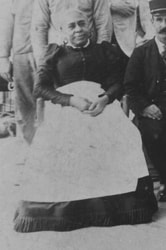 Fannie M. Anthony - Stewardess of the Mary Powell Fannie M. Anthony was Stewardess aboard the steamboat Mary Powell for more than 40 years, from approximately 1870-1912. Of mixed Indigenous and Black heritage, Fannie fought stereotypes to become a beloved figure on the Hudson River. 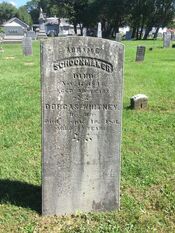 Dorcas Schoonmaker vs. the President When her husband Abram died, Dorcas took his place as keeper of the Saugerties Lighthouse in the 1840s. But at a time when all lighthouse keepers were political appointees, a change in the Presidency put her career at risk. 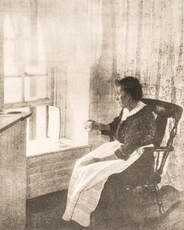 Media Monday: Kate Walker and Robbins Reef Lighthouse From 1890 to 1919 Kate Walker kept the Robbins Reef Lighthouse. Located in the middle of New York Harbor, south of the Statue of Liberty, Kate kept the light burning. 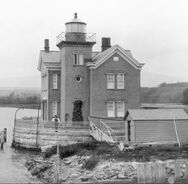 Kate and Ellen Crowley - Heroic Guardians of the Saugerties Light When their father lost his sight, Kate Crowley took his place as keeper of the Saugerties Lighthouse in the 1870s. With her sister Ellen, they kept the light, cared for their parents, and even affected daring rescues. 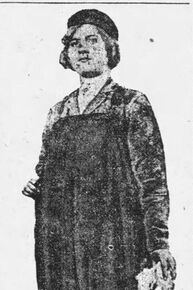 Woman Welder on the Rondout Danish widow and welder Mrs. Catherine Nelson is the only woman known to have worked on the construction of the Rondout Creek Suspension Bridge, in 1921. 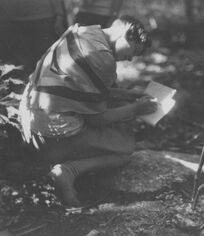 Women in the Forest: Tree Ladies and the Creation of the Palisades Interstate Park Guest author Jeanne Haffner, PhD recounts how women helped save the Palisades and build the Palisades Interstate Park. 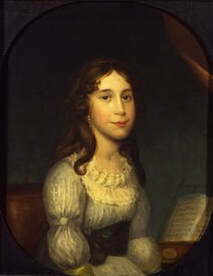 The Women of Schuyler Mansion Guest author Danielle Funicello traces the lives of the Schuyler women and their impact on New York State and national history. 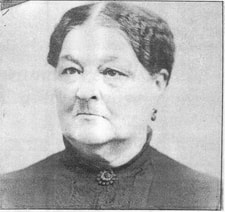 The Indomitable Catherine Murdock The local favorite! Catherine Murdock served as keeper of the Rondout Lighthouse for over 50 years, from 1856 to 1907. For more Women's history, join us for the virtual lecture "Espionage and Enslavement in the Revolution: The True Story of Robert Townsend and Elizabeth" by Claire Bellerjeau on Wednesday, April 13, 2022 at 7:00 PM on Zoom! You can check out more events and offerings at Women's History Month Kingston. If you enjoyed this post and would like to support more history blog content, please make a donation to the Hudson River Maritime Museum or become a member today!
Today's Media Monday post is all about extremely cold wintry conditions on the Hudson River in 1934, featuring footage of the Tarrytown (a.k.a. Sleepy Hollow) Lighthouse! This short film from British Pathe/Reuters features aerial footage of New York City and the Lower Hudson. The cold snap was deadly, as outlined below. On February 9, 1934, the New York Times reported on the record-breaking subzero temperatures, writing "At Tarrytown, powerful government tugs pounded at the ice that had formed in the harbor. They were trying to open a lane for lighters on which several hundred automobiles from the plants of the Chevrolet and Pontiac companies had been loaded for transport to New York. The Cars were destined for shipment to Europe. The ice in the harbor was more than fourteen inches thick and the tugs were unable to smash their way through." On February 10th, the Times published an article entitled, "Mercury 14.3 Below Zero on New York's Coldest Day: Six Dead and Hundreds Treated for Frostbitten Ears and Noses - 8-10 Below Due Here Today." Hundreds of school children needed to be treated for frostbite, six people died in their homes or on the streets due to the cold weather, and dozens of people suffered from carbon monoxide poisoning while trying to heat their vehicles in closed garages (none died). Snow removal efforts were halted due to the extreme cold, fire hydrants froze, and evictions were postponed. In maritime news, the Times reported, "The Coast Guard ice breaker AB-24 found the ice in the Great South Bay too strong even for her sharp prow. Hempstead Harbor also was icebound, causing some concern to industries there dependent on water carriers for supplies. The Bronx and Passaic Rivers were frozen solid and in the later fifty small craft were in danger of being crushed by the ice. In the Poconos and in New Jersey the finest supplies of ice in years were reported but - it was too cold for men to cut it." By February 11, 1934 the temperatures rose to more seasonal just-below-freezing, but 1934 remained one of the coldest winters on record for New York City. If you enjoyed this post and would like to support more history blog content, please make a donation to the Hudson River Maritime Museum or become a member today!
Today's Media Monday post is another teaser trailer for our forthcoming documentary film, "Seven Sentinels: Lighthouses of the Hudson River." The museum is crowdfunding for this film on Indiegogo, so help us make it a reality and get some really cool perks in return. We have made significant progress toward our goal - will you help us reach it before January 13? "Ice Guardians" is a teaser trailer look at some of the amazing footage filmmaker Jeff Mertz got of the Hudson-Athens, Rondout, and Esopus Meadows Lighthouses last winter. As we approach the holiday season, it seemed apt to share the icy beauty with everyone. The drone footage also reveals how isolating life at a lighthouse in winter could be, and how the lighthouses themselves needed to be protected from the heavy floes of ice. If you missed the first trailer, catch up below! We have already received dozens of individual donations, as well as support from Ulster Savings Bank, Rondout Savings Bank, and Ulster County Cultural Services & Promotion Fund administered by Arts Mid-Hudson. But we've still got a ways to go before we reach our goal, and just under a month to do it in.
You can help by liking, commenting on, and sharing our social media posts, YouTube videos, and this blog post. If you'd like to do more to help, you can join our individual fundraiser contest, where you can get credit for donations from family and friends on Facebook and other platforms. Check out our latest campaign update to learn more. You can earn the same perks as higher level backers. And, if you'd like to donate to the film but don't want to do so online, you can always mail us a check! Send it to the Hudson River Maritime Museum, 50 Rondout Landing, Kingston, NY 12401 and write "Seven Sentinels" or "lighthouse film" in the check memo line. In the spirit of the Seven Sentinels film, today we are revisiting a time in which all lighthouse keepers in the country were direct political appointments by the President of the United States. This form of political patronage was legally in place until the 1890s, and in the early days of lighthouses, meant that keepers were replaced at every election. Although numerous Hudson River Lighthouse keepers were removed - for one reason or another - under this system, one of the most egregious examples was the removal of lighthouse keeper Dorcas Schoonmaker of the Saugerties Lighthouse. Dorcas became keeper after the death of her husband Abram Schoonmaker, who had replaced former keeper (and member of the opposite political party) Joseph Burhans in the last. In 1849, Dorcas, a widow with young children, was removed from her position and Joseph Burhans was put back in place. There were few options for widowed women to make a living for their families in the 1840s and '50s, especially if they did not own a home from which to operate a boarding house or similar business. We have found at least two newspaper articles eviscerating President Zachary Taylor for his decision to replace Dorcas (even though it is likely he had no hand in the decision-making at all, leaving it to local party bosses). But perhaps justice was ultimately served - Taylor became the shortest-serving president in U.S. history, dying suddenly just 16 months after taking office. You can read transcriptions of the newspapers below, both of which quote the Saugerties Telegraph: "Taylor Continues Proscribing Women." Monmouth Democrat, Freehold, NY, August 9, 1849. The conduct of the heartless Administration is daily developing more and more of its enormous propensities for proscription. The removal of prominent office holders, of indomitable Democracy and enemies of every phase of whiggery, is a prerogative in the exercise of which we shall not complain. But when women, widows with families of children, are hunted and deposed, to gratify a vindicative [sic] political revenge, we think such outrages should call upon the head of Taylor the indignation of every honest man in the community. We have noticed previously, the removal of women from petty post-offices, the income barely being sufficient for their support. The latest instance which has come to our knowledge, is as disgraceful as those which have preceeded [sic] it. It is the removal of Mrs. Dorcas Schoonmaker, a poor and highly respectable lady, from the office of keeper of the Saugerties light-house, in the Hudson River - The Telegraph, published in that village, thus alludes to the case. Under President Tyler's Administration, in 1844, Abram E. Schoonmaker was appointed keeper of the light-house at this place [Saugerties]. He had been a boatman for years, and was at that time unable to perform hard labor. His appointment gave universal satisfaction to both parties. The salary supported him and his family. He was very attentive to his duties, and continued to hold office to the time of his death, in 1846. During the last year of his life, while he was confined to his room, and the greater part of the time to his bed, the duties were performed by his wife, and with such marked regularity and attention as to receive the universal commendation of the boatmen on the river. So interested were the masters of vessels on the Hudson on behalf of this lady, then as now a widow, with a family of children dependent on her for support, that a petition for her appointment to the office was at once drawn up, numerously signed, and forwarded to the proper department, and she was accordingly appointed. She has held the office from that time until this week, when she was removed to make room for Joseph H. Burhans, who was considered, it seems, entitled to receive it from the present administration - being a blue-light Federalist of the Hartford Convention school. It further states a remonstrance had been forwarded to the proper authorities, protesting against her removal, signed by every steamboat captain and every sloop captain navigating the Hudson, to whom it was presented, Whigs as well as Democrats, being a large majority of the officers of boats on the river; all of whom bore testimony that never since the first establishment of the light-house, has the light been kept with that care at all times of night as during the time when Mrs. Schoonmaker had charge of it. But all to no purpose. The voters of Ulster county will give Taylor such a demonstration at the next election, as will teach him a lesson which the Whigs of this State will be compelled to commit to memory. On the same day, all the way down in Tennessee, Mrs. Dorcas Schoonmaker also made the news, in largely the same language: "The Second Washington," The Daily Union (Nashville, Tennessee), August 9, 1849. General Taylor has removed Mrs. DORCAS SCHOONMAKER, a poor and highly respected lady, from the office of keeper of the Saugerties light-house, in the Hudson River. The Telegraph, published at that place, thus alludes to this case: Under President Tyler's Administration, in 1844, Abram E. Schoonmaker was appointed keeper of the light-house at this place [Saugerties]. He had been a boatman for years, and was at that time unable to perform hard labor. His appointment gave universal satisfaction to both parties. The salary supported him and his family. He was very attentive to his duties, and continued to hold office to the time of his death, in 1846. During the last year of his life, while he was confined to his room, and the greater part of the time to his bed, the duties were performed by his wife, and with such marked regularity and attention as to receive the universal commendation of the boatmen on the river. So interested were the masters of vessels on the Hudson on behalf of this lady, then as now a widow, with a family of children dependent on her for support, that a petition for her appointment to the office was at once drawn up, numerously signed, and forwarded to the proper department, and she was accordingly appointed. She has held the office from that time until this week, when she was removed to make room for Jos. H. Burhans, who was considered, it seems, entitled to receive it from the present administration - being a blue-light Federalist of the Hartford Convention school. The Cincinnati Enquirer says that a remonstrance has been sent to Washington against her removal, signed by every steamboat Captain and sloop Captain navigating the Hudson, to whom it was presented - whigs as well as democrats - being a large majority of all the officers of boats on that river; all of whom bear testimony that never since the first establishment of the light-house, has the light been kept with that care at all times of night as during the time when Mrs. SCHOONMAKER had charge of it. Is not that small business for the "Second Washington?" With references to the Cincinnati Enquirer, it seems as though the plight of Mrs. Schoonmaker may have gone "viral" in 1849, with her story published in multiple newspapers throughout the country. Sadly, Dorcas, who had lost several children in addition to her husband, moved in with one of her adult daughters and died just a few years later, in 1851, at the age of 49. She is buried with Abram in Mountain View Cemetery in Saugerties, NY. If you enjoyed this post and would like to support more history blog content, please make a donation to the Hudson River Maritime Museum or become a member today! You can also donate to support the museum's upcoming documentary film, "Seven Sentinels: Lighthouses of the Hudson River," which will include this story and many more.
Today's Featured Artifact is actually from our research library, although it is old enough to be its own artifact. It is the leather-bound book, Instructions and Directions to Light-House and Light-Vessel Keepers in the United States. This third edition was published in 1858 by the United States Light-House Establishment (later the United States Lighthouse Service) and this particular copy is embossed on the leather front cover that it is the property of the United States Light-House Establishment and that this particular copy belongs to the Van Wie's Point Light. Van Wie's Point Light was a white stone beacon light located off of Van Wie's Point, which is on the West side of the Hudson River, half way between Castleton-on-Hudson and Glenmont, NY, across from Papscanee Island. It was installed in 1854 and the tower did not include keeper's quarters. Henry Van Wie hired as keeper in 1853, presumably while the beacon was being constructed, but he was dismissed before the year was out and replaced with Herman Wendell, who served from 1853 to 1858, when he was also dismissed. Finally, in 1858, a suitable keeper was found - William Welch (husband of Catherine Van Wie). Welch was keeper when this instruction manual arrived, writing in large, loopy script, "Rec'd August, 1860." 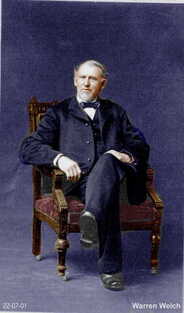 Colorized photo of Warren Welch, uploaded to ancestry.com. Colorized photo of Warren Welch, uploaded to ancestry.com. William Welch remained on as lighthouse keeper until his death on September 7, 1910 at age 93 - the oldest and longest-serving light keeper in Hudson River history, serving 52 years (beating Catherine Murdock by at least one, if not two years). He was succeeded by his son, Warren Welch (who was 66 years old at the time), who served as keeper until at least 1915. Before his death in 1930, Warren Welch also served as chief engineer aboard the steamboat "Hendrick Hudson." Van Wies Point Light was replaced with a black skeleton tower sometime in the 1930s. Although this particular version of the lighthouse keepers instructions has not been digitized, you can read the 1881 Instructions to Light Keepers by clicking the button below. If you enjoyed this post and would like to support more history blog content, please make a donation to the Hudson River Maritime Museum or become a member today!
|
AuthorThis blog is written by Hudson River Maritime Museum staff, volunteers and guest contributors. Archives
July 2024
Categories
All
|
|
GET IN TOUCH
Hudson River Maritime Museum
50 Rondout Landing Kingston, NY 12401 845-338-0071 [email protected] Contact Us |
GET INVOLVED |
stay connected |
